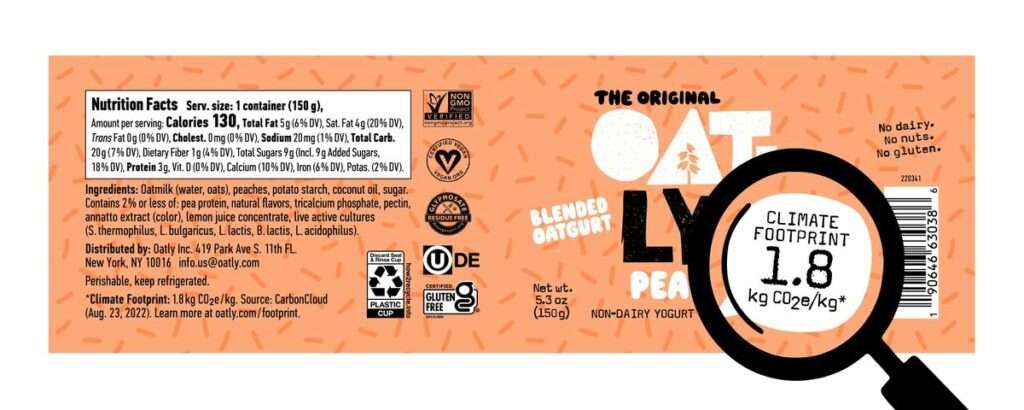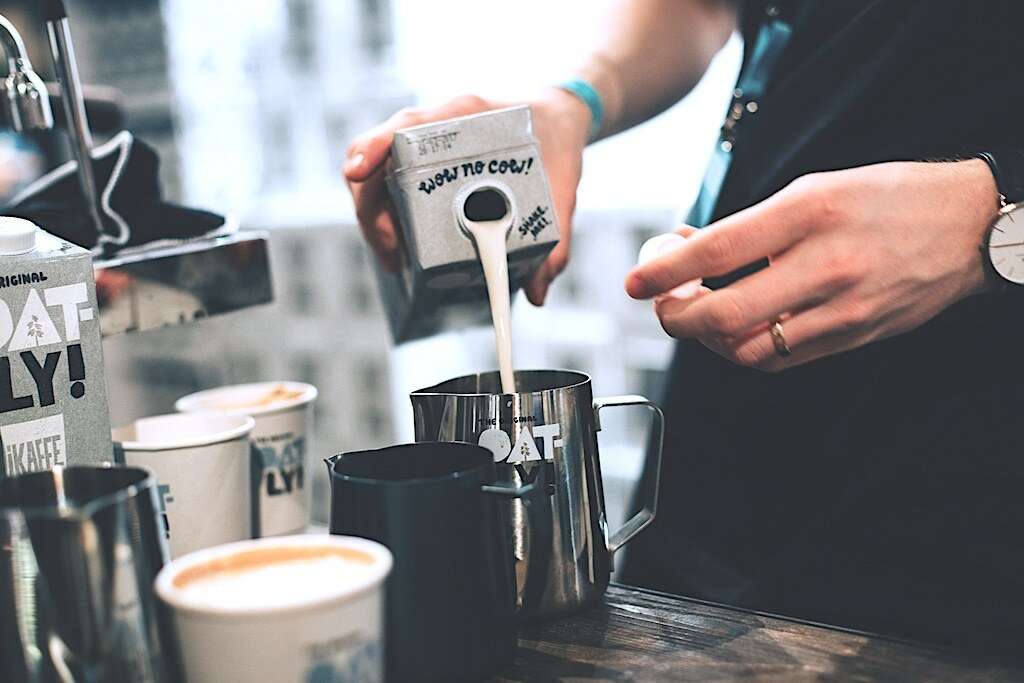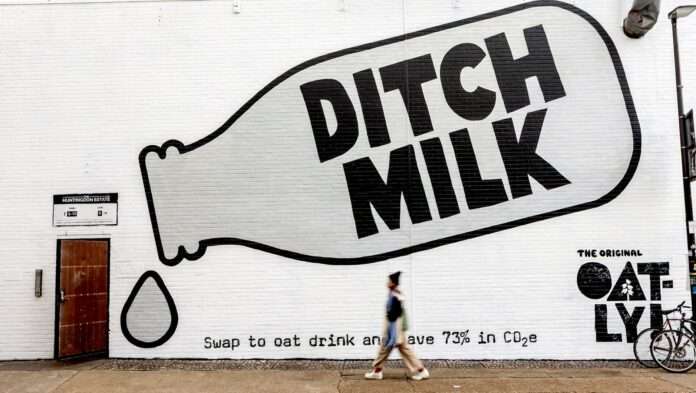Leading oat milk brand Oatly is known for its quirky packaging and changing the narrative on dairy-free milk. And now, the brand is adding one more bit of info to its U.S. labels: its climate footprint.
Oatly’s Oatgurt dairy-free yogurt products will be the first to include the company’s climate footprint labeling in North America. It’s an effort to show the climate impact of the product, a move Oatly says aligns with its belief that consumer choice and education play crucial roles in shifting to a more sustainable food system.
“With the world facing a climate emergency, Oatly is empowering consumers to compare the climate impact of products while in the grocery aisle, just as they can compare those same products’ nutritional information,” the company said in a press release.
Transforming the food industry is necessary to meet the current climate challenge.
-Julie Kunen, Director of Sustainability at Oatly North America
Oatly says consumers should have access to all the information needed to make informed purchasing decisions and understand “the fuller picture” of a product’s climate impact — not just how it can affect their personal health, which nutrition panels address, but also the health of the planet.
“Transforming the food industry is necessary to meet the current climate challenge, and we believe providing consumers with information to understand the impact of their food choices is one way we as a company can contribute to that effort,” Julie Kunen, Director of Sustainability at Oatly North America, said in a statement.
“We’re motivated every day at Oatly to deliver products that are good for both people and the planet. We hope this next step of transparently bringing climate information to the forefront inspires other companies to do the same and helps consumers begin to recognize and learn about these indicators as they shop for their households,” she said.

The company has included climate labels on products sold across Europe since 2021, but this marks its first climate labels in North America.
The labels are formulated by showcasing kilograms of carbon dioxide equivalents (CO2e) based on the life cycle assessments “from grower to grocer.” CO2e includes a range of emissions including carbon, methane, and nitrous oxide calculated by their warming potential over 100 years. Oatly partnered with CarbonCloud to aggregate the emissions data.
While nutrition labels have been standardized to orient consumers to the impacts of their dietary choices, there are currently no standards for carbon reporting on food. Oatly says that until standards are mandated, it aims to encourage other food companies to report their impact. “If Oatly is only one of a few to make this commitment, it’s difficult for consumers to make informed purchases against other products in the market,” the company says.
“We didn’t put CO2e out there for consumers to see just for fun,” reads the Oatly website. “We did it in more of a ‘We believe that consumer empowerment should be a law, if not a human right’ kind of way. But change doesn’t just happen randomly. Someone needs to lead the charge. So we thought, ‘Why couldn’t it be a small oatmilk company that paves the way?’ And that’s exactly what Oatly has started to do. First in Europe, and now here in North America.”
Oat milk leader
Sweden-based Oatly is the leading oat milk beverage brand in the U.S., driving coffee shops such as Ble Bottle to make oat milk the default instead of dairy as consumers continue to make the switch.
The company went public last May, despite some lagging sales, a recall, and stock issues during the pandemic. Oatly recorded a strong Q3 in 2022, up seven percent over 2021. It estimates 2022 revenue will total between $700 million and $720 million, up nine to 12 percent over 2021, but down over its August $800 million to $830 million forecast.
“Third quarter financial results were below our expectations, largely driven by COVID-19 restrictions in Asia, production challenges in the Americas and continued foreign exchange headwinds,” Toni Petersson, Oatly’s CEO, said in a statement.

“However, we continue to see strong velocities, year-over-year sales volume growth and minimal price elasticity globally, demonstrating the brand’s power and resilience. We have taken decisive and strategic actions to improve our operational efficiencies in a volatile macroeconomic environment with an even more focused allocation of resources and capital.”
Petersson says these actions will “simplify its organizational structures and the execution of its supply chain network expansion.”
Despite the wobble, the company says it’s full steam ahead; Oatly’s aim is to deliver dairy-free products that make it easy for consumers to switch from conventional dairy — a leading producer of emissions.
The company has not been shy about its stance against animal products, using its cartons and ads to levy attacks against the dairy industry. Last Thanksgiving, it pivoted its focus to all animal products and launched a “hotline,” the Oatly Emotional Support Hotline for Plant-Based Eaters, targeting people who struggle during the holiday that centers around a stuffed turkey.
Oatly says its Oatgurts’ climate footprint range between 1.7 and 1.9 kg CO2e/kg. The climate impacts of an additional 12 Oatly products sold in North America can be viewed on the company’s website.
“This line of newly reformulated Oatgurts delivers on just that and more,” said Leah Hoxie, SVP of Innovation at Oatly North America, “deliciousness, great texture, and a variety of tasty flavors that people crave.”
Related on Ethos:


